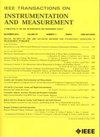Temperature-Enhanced Type Compensation Method for Large-Range Eddy Current Displacement Sensors
IF 5.6
2区 工程技术
Q1 ENGINEERING, ELECTRICAL & ELECTRONIC
IEEE Transactions on Instrumentation and Measurement
Pub Date : 2025-06-18
DOI:10.1109/TIM.2025.3580897
引用次数: 0
Abstract
The eddy current displacement sensors (ECDSs) are widely used in precision industrial applications, but they are susceptible to temperature drift under varying temperature conditions, which limits their measurement accuracy. This study proposes a novel temperature compensation method aimed at improving the performance of (ECDS) across a broad temperature range. This method utilizes phase characteristics and dual ac bridge technology to effectively separate the temperature drift of the probe coil from the target displacement changes. In this way, the temperature stability of large-range ECDS is significantly enhanced, and drift caused by temperature changes in the probe coil is further eliminated through temperature calibration. Laboratory tests have shown that this method effectively reduces temperature-related displacement drift from 2093 to 132 ppm/°C within a temperature range of大量程涡流位移传感器的温度增强型补偿方法
涡流位移传感器在精密工业中得到了广泛的应用,但其在不同的温度条件下易受温度漂移的影响,限制了其测量精度。本研究提出了一种新的温度补偿方法,旨在提高(ECDS)在宽温度范围内的性能。该方法利用相位特性和双交流电桥技术,有效地分离了探头线圈的温度漂移和目标位移变化。这样可以显著增强大量程ECDS的温度稳定性,并通过温度校准进一步消除探针线圈温度变化引起的漂移。实验室测试表明,该方法在20~ $ {\circ}$ C ~ $100~ $ {\circ}$ C的温度范围内,有效地将温度相关位移漂移从2093减小到132 ppm/°C。结果表明,该方法显著提高了ECDS在大温差环境下的测量精度和可靠性,为精密测量领域提供了重要的技术支持。
本文章由计算机程序翻译,如有差异,请以英文原文为准。
求助全文
约1分钟内获得全文
求助全文
来源期刊

IEEE Transactions on Instrumentation and Measurement
工程技术-工程:电子与电气
CiteScore
9.00
自引率
23.20%
发文量
1294
审稿时长
3.9 months
期刊介绍:
Papers are sought that address innovative solutions to the development and use of electrical and electronic instruments and equipment to measure, monitor and/or record physical phenomena for the purpose of advancing measurement science, methods, functionality and applications. The scope of these papers may encompass: (1) theory, methodology, and practice of measurement; (2) design, development and evaluation of instrumentation and measurement systems and components used in generating, acquiring, conditioning and processing signals; (3) analysis, representation, display, and preservation of the information obtained from a set of measurements; and (4) scientific and technical support to establishment and maintenance of technical standards in the field of Instrumentation and Measurement.
 求助内容:
求助内容: 应助结果提醒方式:
应助结果提醒方式:


